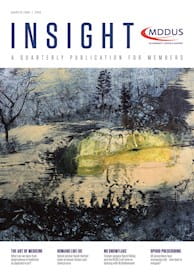
OUR PRACTICE has received an anonymous letter informing us that a patient has been selling his prescription medicine. What is our legal obligation in this matter? Should we report him to the police? Are we within our rights to remove him from the practice register?
When such vague information is received from an anonymous source it can be tempting to disregard it as hearsay and do nothing, perhaps assuming it to be vexatious in nature. Whilst this may be possible, it could be that the letter represents a genuine concern for others and a trust that medical professionals have the knowledge and integrity to react appropriately. Such trust underpins much of the GMC’s ethical guidance.
However, a key principle of GMC guidance is to make the care of your patient your first concern. It may therefore be appropriate to invite the patient in to explore the issues raised in the letter, provided this does not risk harm to any individual. You may receive information from the patient that reassures you the allegations are not well-founded. Even if you are not reassured of this, you could discuss any potential risks to the patient’s health of non-compliance with treatment arising as a consequence of selling medication.
From a legal point of view, under the Medicines Act 1968, prescription medication can only be sold or supplied at a registered pharmacy and under the supervision of a pharmacist, in accordance with an appropriate practitioner’s prescription. If the medicines are controlled drugs, selling them is also an offence under the Misuse of Trust Act 1971. However, neither law obliges anyone to report such an offence.
Whilst there is no obligation to disclose information about a crime when it is not required by law, it is recognised that doctors have a wider professional duty to protect and promote the health of patients and the public, for example by protecting individuals or society from risks of major harm.
Ordinarily, consent should be sought from the patient to disclose information to allow these allegations to be investigated. Clearly it is not likely that such consent would be forthcoming in this situation but the issue of onwards disclosure should be broached (unless this would increase the risk of harm arising).
Disclosure of relevant information without consent in the public interest is appropriate in situations where it is "likely to be necessary for the prevention, detection or prosecution of serious crime, especially crimes against the person" (GMC guidance on Confidentiality).
In this particular circumstance, the crime may not meet the threshold to be considered "serious", which would usually refer to crimes such as murder, manslaughter, rape or child abuse. However, the serious harm threshold could be met, for example, were the patient a teacher and it was reported that he was selling controlled drugs to his students, which could be a child safeguarding issue. The specific details of the situation must therefore be taken into account.
If you intend to disclose without consent, you should inform the patient of this and what information you will be disclosing (again, unless this would worsen risk).
Were the allegations to have merit, you might consider whether the doctor-patient relationship has broken down (although the GMC considers such circumstances rare). Even if you feel there has been a breakdown in trust, removing the patient from the practice register (while tempting) should only be considered after repetition of unreasonable or inconsiderate behaviour, as set out in a warning letter.
You should try to do what you can to restore the professional relationship and explore alternatives to ending it. This may involve talking to the patient about the allegations and explaining why, if true, this is not appropriate either legally and ethically. Consider whether the patient is suffering financial difficulty or from a mental health problem such as stress/anxiety, which may provide some mitigation. Ask for a commitment to cease such activities.
Guidance on prescribing is also relevant here. You should reassure yourself that prescribing is appropriate, safe and serves the need of the patient. You could review the dose of the medicines and the ongoing need. If the patient has not been compliant, you could consider whether prescribing could be stopped or look at alternative medications less conducive to selling.
You may also consider taking steps to monitor and control any ongoing supply of medicines more carefully, for example by providing prescriptions of shorter duration. If the patient has been compliant but is receiving prescriptions too frequently (for example by making early requests or by claiming to have lost prescriptions), you may need to review practice systems to reduce the likelihood of repetition for both that individual and other patients.
With so many ethical and legal considerations involved, it is important to explore all the factors and use your judgment to balance the interests of the patient with those of the wider public. Remember that MDDUS is here to provide further advice and support.
Dr Myooran Nathan is a medical adviser at MDDUS
This page was correct at the time of publication. Any guidance is intended as general guidance for members only. If you are a member and need specific advice relating to your own circumstances, please contact one of our advisers.
Read more from this issue of Insight

Save this article
Save this article to a list of favourite articles which members can access in their account.
Save to library